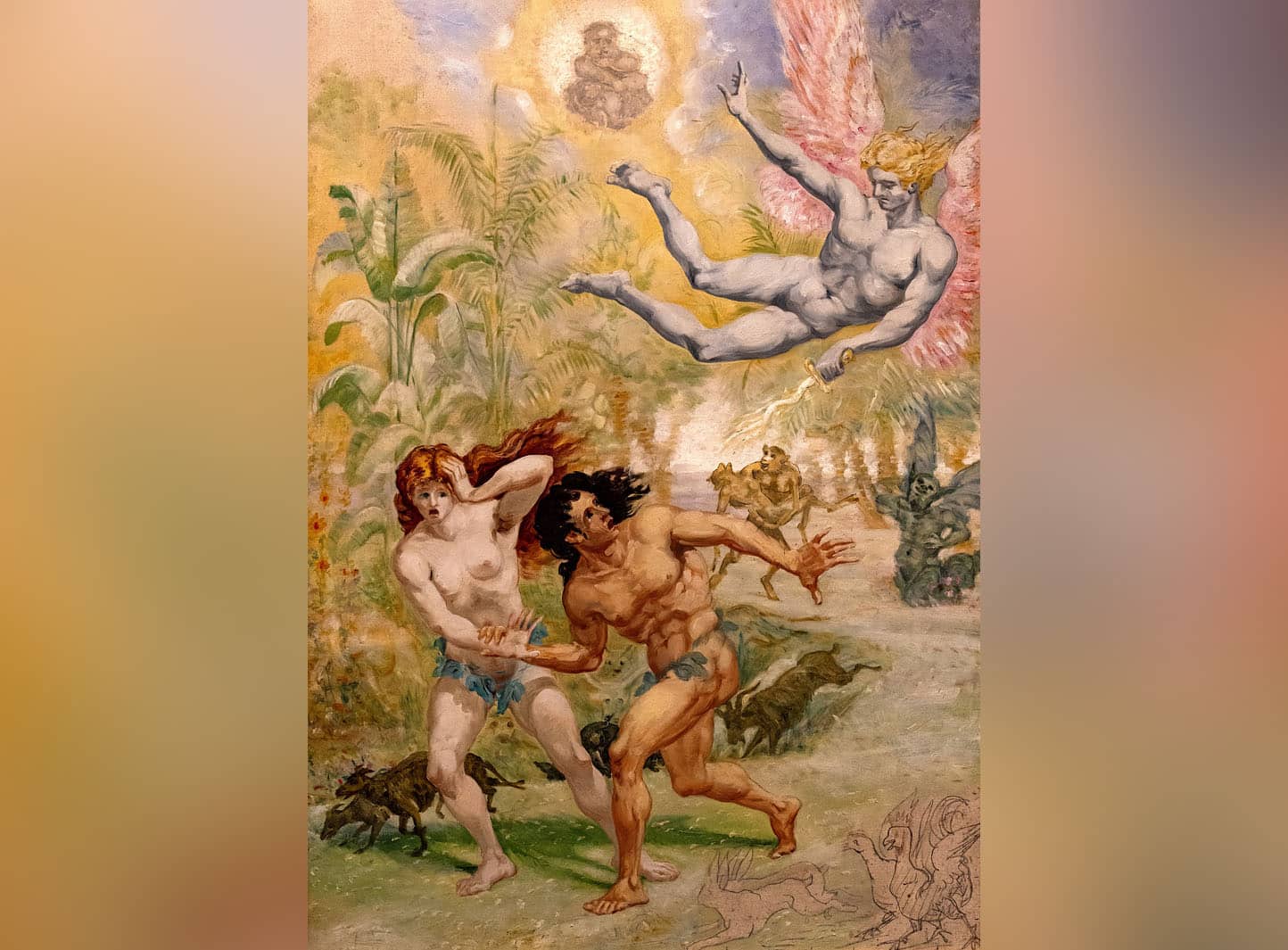 (Gaillac) Eve et Adam chassés du Paradis – Jean-Baptiste Cariven – Musée des Beaux-Arts de Gaillac (Wikimedia Commons/Public domain)
(Gaillac) Eve et Adam chassés du Paradis – Jean-Baptiste Cariven – Musée des Beaux-Arts de Gaillac (Wikimedia Commons/Public domain) With sad humility I sing the disappearance of an anomaly,
illusional and elusive, the security deposit that we lost
on October seven, like the one
we lost in paradise, while having fun:
Hamas-hammered ice-wall melting, climate-changed while lacking permafrost,
Homo Zionistis’ unanonymous humanitarian homily.
Scoffs and scorns about the views
of diaspora and Israeli Jews
are based on a sense of difference,
code words for racial preference.
This prejudice isn’t predicated,
I classically claim, in verba nullius,
while citing Anthony Julius,
on views of the unedicated—
too many “I accusers”
being high IQsers.
From the sea unto the river
I pray the good Lord us to deliver.
Nullius in verba (Latin for “no one’s words” or “take nobody’s word for it”) is the motto of the Royal Society. John Evelyn and other fellows of the Royal Society chose the motto soon after the Society’s founding in 1660.
Anthony Julius, a professor in the Faculty of Laws, University College London, makes this contribution to “Before and After October 7: A Symposium,” in the Jewish Review of Books, winter 2024:
Out of a certain bleakness of mood, which may pass, it seems to me that some of my beliefs have been proven fully wrong since October 7.
First, my belief that certain words or actions—to be more exact, certain defamations or certain atrocities—if done or said, would cause even the most venomous among our enemies to hesitate before doing or saying such things again and give pause to even their most resolute supporters. But no, as it turns out—not at all. It is now clear to me—the very worst things having happened and the most repellent things having been said—that we should expect repetition, if our enemies have the chance, and solicitous endorsement, if the chance is taken.
Second, my belief that the right way to think about anti-Zionism was as a cosmopolitanism polluted by antisemitism or a Palestinian nationalism polluted by antisemitism. Anti-Zionism, with an effort, could avoid such pollution—if only conceptually. That was wrong too. It is now clear to me that Jews face two enemy ideologies; one is antisemitism, and the other is anti-Zionism. Antisemitism is a hatred of the Jewish people. Anti-Zionism is a hatred of the Jewish state. It was easy to muddle the two but they are, in fact, distinct, if similar and similarly dangerous, ideologies. They are both nihilistic, both vicious, both stupid, and both threaten Jewish life, Jewish morale, the Jewish future. It is an open question which, in current times, is the more lethal.
Third, my belief that the institutions on which we rely would remain strong and would protect us. I was wrong about this too. Institutions are a double disappointment—weak and indifferent (when not actively hostile). From a British perspective, the greatest disappointments have been certain universities, the London police, the BBC. They have shown Jews a very cold, hard face. The universities prompted least surprise, the BBC, the greatest surprise. The unforgivable misreporting of the al-Ahli Arab Hospital incident, insouciantly dismissed weeks later by International Editor Jeremy Bowen, still shocks me.
Other beliefs, however, have become stronger. I hold them now with a greater intensity of conviction than I did before October 7.
First, my belief that each one among us must do everything we can to frustrate the recurrence of that unpunished historical phenomenon, the mass murder of Jews. The discovery in early December of a Hamas terror plot against Europe’s Jews may have been a first indication that we are already on the back foot.
Second, my belief that no arguments, no reasons or facts, no appeals or compromises will weaken the enmity directed at us. We should drop all such efforts, then. It is as pointless as it is ignominious—ignominious because pointless. Of course, this does not mean we should stop reasoning about our situation among ourselves. This is critical, if only to limit the demoralization experienced by many on our side, especially students and other young people, who are most susceptible to the tribal attractions of the post-left anti-Zionist movement.
Third, my belief that the postwar period, in which Jews enjoyed relative security, was utterly anomalous.
Gershon Hepner is a poet who has written over 25,000 poems on subjects ranging from music to literature, politics to Torah. He grew up in England and moved to Los Angeles in 1976. Using his varied interests and experiences, he has authored dozens of papers in medical and academic journals, and authored “Legal Friction: Law, Narrative, and Identity Politics in Biblical Israel.” He can be reached at gershonhepner@gmail.com.























 More news and opinions than at a Shabbat dinner, right in your inbox.
More news and opinions than at a Shabbat dinner, right in your inbox.